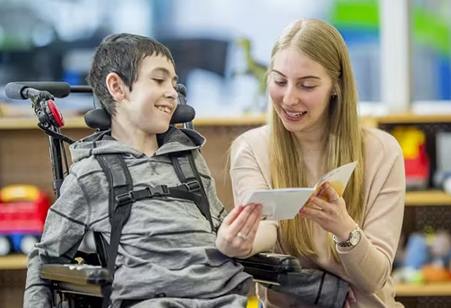NDIS Support for Childhood Brain Injury: Unlocking Potential

Childhood brain injuries, whether caused by trauma, illness, or congenital conditions, have the potential to impact a child’s life in profound ways. From cognitive and physical challenges to emotional struggles, these injuries create barriers to development. Fortunately, the National Disability Insurance Scheme (NDIS) provides a lifeline for families and children dealing with these challenges, offering comprehensive support designed to enhance the quality of life and foster independence.
Childhood brain injuries may result from a variety of causes, including accidents, strokes, infections, or developmental disorders. The severity of the injury can vary, and the impacts can range from mild impairments to more severe, life-altering consequences. These injuries may manifest as:

Cognitive impairments: Challenges with memory, attention, and learning.
Physical disabilities: Difficulties with movement, coordination, and speech.
Behavioral and emotional changes: Problems such as mood swings, aggression, and social difficulties
The NDIS recognizes the complexity of these injuries and tailors support services to meet the unique needs of each child.
The NDIS provides vital support to children living with brain injuries, empowering them to overcome challenges and reach their full potential. The support provided can make a significant difference in the lives of children and their families, including:
Early intervention is critical for children with brain injuries. The NDIS focuses on providing support as soon as possible to maximize developmental outcomes. Services may include speech therapy, occupational therapy, and physical therapy to help children improve their motor skills, cognitive abilities, and communication.
The NDIS funds a range of therapeutic services designed to assist children with brain injuries in managing their conditions. These services can include:
Speech therapy: To help children with speech and language difficulties.
Physiotherapy: Aimed at improving movement, coordination, and strength.
Occupational therapy: Focused on enhancing daily living skills and sensory processing. Therapists work closely with the child and their family to create tailored programs for their specific needs.
For many children, specialized equipment can be a game-changer in their development. NDIS support covers the cost of devices that assist with mobility, communication, or daily tasks. This might include:
Wheelchairs or mobility aids for those with physical disabilities.
Communication devices for children with speech impairments.
Adaptive equipment for improving independence in daily life.
The NDIS recognizes that childhood brain injuries affect not just the child, but the whole family. As such, it offers supports for caregivers to help manage the challenges they face. These can include:
Respite care: Offering family members a break while ensuring the child continues to receive care.
Training and education: Teaching families how to best support their child’s development.
Support coordination: Assisting families in navigating the NDIS system and accessing the right services.
For children with more significant impairments, the NDIS funds personal care and support services. These services help with activities of daily living, such as bathing, dressing, and eating, ensuring that children receive the care they need while maintaining their dignity and comfort.

To access NDIS support, families must first ensure that their child meets the eligibility criteria. The application process can be complex, requiring documentation from medical professionals, including reports about the child’s injury, treatment, and ongoing needs. Once eligibility is confirmed, the NDIS will work with families to develop a personalized plan that outlines the specific supports and services the child will receive.
It’s important to note that the NDIS provides ongoing funding, meaning that the child’s plan will be reviewed periodically to ensure that the supports remain relevant and effective. This dynamic process allows the NDIS to adapt to the child’s changing needs as they grow and develop.
While the NDIS offers critical support for children with brain injuries, accessing services can sometimes be challenging. Common obstacles include:

Long waiting times: The application process can be lengthy, and families may experience delays in receiving services.
Complex documentation: Gathering the necessary medical reports and assessments can be time-consuming and stressful.
Navigating the system: The NDIS process can be overwhelming, especially for families who are new to the system or have complex needs.
To overcome these challenges, families can seek assistance from NDIS support coordinators, who are trained to help navigate the system and ensure that children receive the support they need.
Research consistently shows that early intervention can lead to better outcomes for children with brain injuries. The sooner support services are introduced, the better the chances for improving the child’s cognitive, physical, and emotional development. The NDIS prioritizes early intervention and provides a range of services designed to address the child’s needs as early as possible.
One of the key goals of the NDIS is to help children with brain injuries become as independent as possible. Through targeted support and services, the NDIS aims to give children the tools they need to participate in everyday activities, from school to socializing with friends. Additionally, by providing families with access to support networks and services, the NDIS helps them feel empowered and capable of managing their child’s care.
Childhood brain injuries are life-changing events that affect not only the child but the entire family. The NDIS offers an essential safety net for families by providing a wide range of services that cater to the unique needs of children with brain injuries. From early intervention and therapeutic supports to assistive technology and family support, the NDIS is committed to helping children with brain injuries lead fulfilling and independent lives. By embracing the comprehensive services available through the NDIS, families can navigate the challenges of childhood brain injury with confidence and hope for the future.

Immediate Care is here to empower individuals and their families, providing the support they need to live fulfilling lives. Our team’s dedication and expertise make us a leader in the field of disability services.
For more information or to discuss how we can support you, contact Immediate Care today.
Woodstock, Victoria 3751